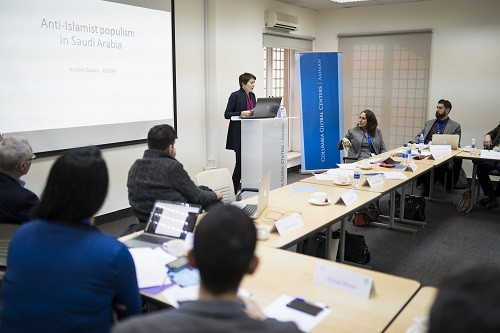Located in Amman, the Center has the advantage of drawing from the diverse array of socio-political structures from within Jordan as well as among its neighbors, including Syria, Iraq, and Saudi Arabia. Through student programs based on constitutional engineering and conferences on refugee integration, the Amman Center is able to engage with regional experts and scholars to encourage continued research and education on the timely and relevant issues that continue to surround this region.
A Century of Palestinian Nationalism: Modes of Political Organization and Representation since 1919
This conference investigated the historical causes for the formation of the First Palestinian Congress, the Muslim-Christian Associations, and the course of the Palestinian National Movement. It also retraced the political and social profiles of those who established these different organizations. In roundtable sessions, participants discussed conflicting ideologies that these political formations championed, the factionalism they produced, the social classes they were rooted in, and their consequences for today’s Palestinian political landscape.
A keynote lecture was delivered by Rashid Khalidi, Edward Said Professor of Modern Arab Studies at Columbia University. Initiated by Dr. Noha Tadros, a former visiting fellow at the Amman Global Center, the conference was organized in partnership with the French Institute for the Near East (Ifpo), the Institute for Palestine Studies, and Al Hekma Association.
Untangling Popular Power: Rhetoric, Faith, and Social Order in the Middle East

In collaboration with the Institute for Religion, Culture and Public Life at Columbia University, the Amman Center held a conference that explored various forms of popular power in the Middle East and North Africa by examining how populism is defined, the role of modern populist movements, how the use of religious identity has shaped these movements, and the relationship between populist ambitions and various media platforms, from print to broadcast to digital.
The two-day conference provided a forum for scholars, local experts, advanced doctoral students, activists, and practitioners to investigate these themes and track how populism that uses religious discourse is being variously deployed across the MENA region. The keynote lecture was delivered by Jon Alterman, Senior Vice President, Zbigniew Brzezinski Chair in Global Security and Geostrategy, and Director of the Middle East Program at the Center for Strategic and International Studies.
Public Engagement
As part of the Center’s commitment to knowledge and to promoting scholarly discourse on a range of issues, the Center continues to host ongoing public talks that seek to spark academic dialogue in the community and help solidify the Center’s presence in the region as a focal point of intellectual engagement.
U.S Foreign Policy in the Middle East Under the Biden Administration
The panel, moderated by David Gardner, International Affairs Editor at the Financial Times, discussed the strategic shifts and foreign policy changes that may be expected in the Middle East and North Africa region from the Biden Administration.
The Hundred Years’ War on Palestine – Book Launch with Rashid Khalidi
A conversation and celebration with Rashid Khalidi on his book, The Hundred Years' War on Palestine.
Is Democracy Secular? A talk by Andrea Cassatella
Andrea Cassatella reflected on the nature and future of democracy, turning to the work of Jacques Derrida to interrogate whether secularism is one of democracy’s necessary and desirable features.
Human Rights in Conflict: A conversation with Omar Shakir
Omar Shakir discussed his deportation from Israel over his human rights advocacy and what it means for the human rights movement on the ground. He also explored the Israeli government's evolving stance towards activists and civil society organizations, human rights violations in the West Bank and Gaza, and issues related to gender and sexuality in the context of prolonged occupation.
Hamas Contained: The Rise and Pacification of Palestinian Resistance – A conversation with Tareq Baconi
In this conversation, Tareq talked about his recent book, in which he focused on the situation in the Gaza Strip today, and discussed how Hamas has been used as a fig leaf by Israel to legitimate policies of separation and isolation of Gaza that long predate the movement. He discussed the post-Oslo era of the Palestinian national movement, and the growing recognition on the ground of the need to shift to a rights-based approach for individual and collective equality across the land of historic Palestine.
The Holocaust and the Nakba: A New Grammar of Trauma and History – A talk with Bashir Bashir
The talk examined how and why the Holocaust and the Nakba are interlinked without blurring fundamental differences between them. While these two foundational tragedies are often discussed separately and in abstraction from the constitutive historical global contexts of nationalism and colonialism, Bashir's talk explored the historical, political, and cultural intersections between them. Bashir argued that these intersections are embedded in cultural imaginations, colonial and asymmetrical power relations, realities, and structures.
Sykes-Picot and Balfour Revisited: Looking Beyond the Maps – A talk with Fawwaz Traboulsi
The talk was based on Traboulsi's book, Sykes-Picot-Balfour: Beyond the Maps, which was inspired by the centenary of the Sykes-Picot Agreement and Balfour Declaration, and by the debate raised about both. The book revisits two founding documents of the modern Near East during the critical decade (1914-1924) that decided the fate of the Arab peoples of the ex-Ottoman Empire, against the background of World War I, the competition between the British and French colonial powers, and the outcome of the 1919 Paris Peace Conference. In his talk, Traboulsi retraced that sequence and addressed issues of unity and partition; natural and artificial states; and what he calls the “fetichism of maps.” He also examined the resources and economic interests at stake in the Franco-British colonial competition.